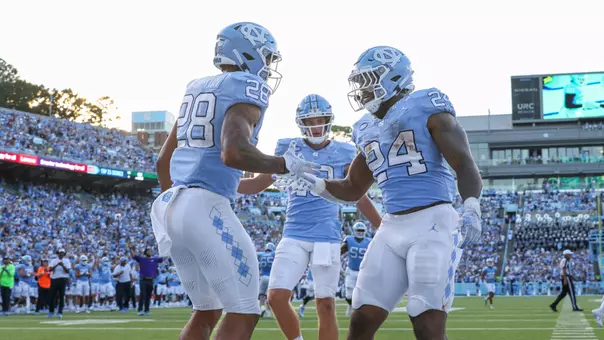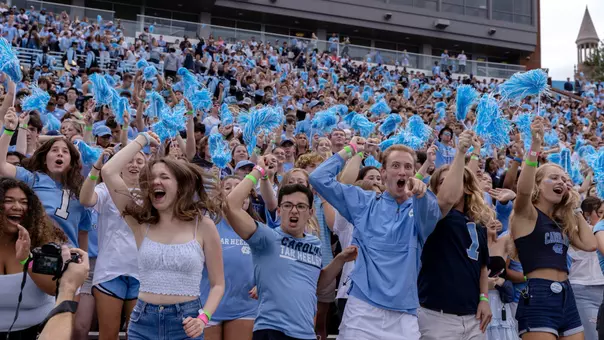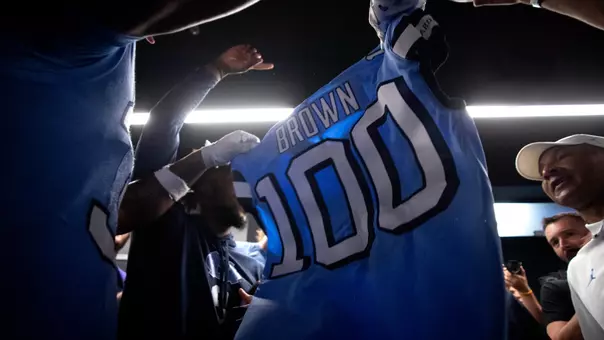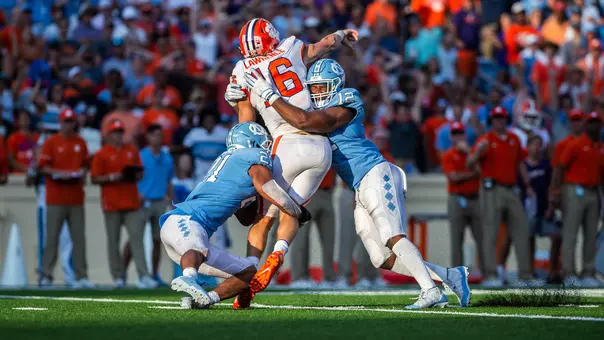University of North Carolina Athletics
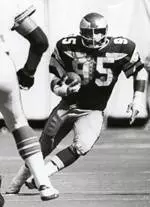
EXTRA POINTS SPECIAL: The Bunting Era Dawns For Carolina
March 29, 2001 | Extra Points
March 26, 2001
Part 1: Introduction
Several dozen former Tar Heel football players settle into their seats in the auditorium of the Kenan Football Center one Wednesday night in late February. Coming up are 50 minutes of information, introductions, opinions, motivation, and proclamations from new head coach John Bunting. This is P.R. 101: Entertain the old troops with a slab of beef, some joshing and laughing and a ticket to the Carolina-State basketball game later that evening. After some welcome remarks, Bunting asks video technician Chris Allen to roll the projector.
"This movie made a big impression on me when I was young," Bunting says. "I'd like you to watch a few minutes of it. I think you'll understand where I'm going with this."
Then he smiles and adds: "You're lucky I don't have you watch the whole thing. Most people, I make 'em watch it all."
On the screen rolls a scene from The Deer Hunter, the 1978 epic of raw nerves, bloody mayhem and tugging heart strings starring Robert De Niro, Christopher Walken and Meryl Streep. The film is set in a 1969 Pennsylvania steel town, where sons of Russian immigrants work the mill, drink beer and, on this particular weekend, prepare to go to Vietnam. The moments with a message come early in the film, when its principals--Michael, played by De Niro, and Nickie, played by Walken--join buddies Steve, Stan, Axel and John in a rollicking bar scene prior to Steve's wedding. Later, Mike and Nick are donning their tuxedos for the ceremony and simultaneously packing for the hunting trip they'll take immediately after the reception. Then, it's off to the abyss in the jungle for Mike, Nick and Steve.
Mike's mantra is "One shot."
He mutters it just after as he guns the gas pedal and squeaks his aging Cadillac between an 18-wheeler and a rock wall, passing the truck and then making a screeching U-turn and stopping in front of a tavern.
He repeats it as he's slipping his shotgun into its carrying case. "One shot, Nick," he says. "That's what it's all about. Two is sissy. I try to tell people. They don't listen anymore." And he screams it several years later to Nick, who he's trying to fish out of the Russian-roulette pits back in Saigon. Nick, his brain fried over the death and decadence of Vietnam, has just squeezed off an empty chamber into his temple. Mike's desperate to get Nick out of danger and headed back home. He promised he'd never leave 'Nam without Nick.
One more shot. Nick pulls the trigger. This one is live and Nick is dead.
"What I believe," Bunting is telling his extended family, "is in brotherhood, friendship, commitment, sacrifice, choices. I believe in precision, in overcoming adversity. I don't like surprises.
"One shot. That's what it's all about. I try to tell people that. That's all we get. The way I look at this job is, I've got one shot. One shot to make it work."
Spring football practice commences Tuesday at the University of North Carolina, and with it comes the daybreak of a new era of Tar Heel football. John Bunting will be the first Carolina head coach since George Barclay in 1953-55 who was himself a Tar Heel during his playing days.
Bunting has been absent the Chapel Hill scene for three decades, off plying his trades in Philadelphia, South Jersey, Kansas City, St. Louis and New Orleans. He's been barely a blip on the radar screen to those who follow the Tar Heels. Never in the searches for replacements for Bill Dooley, Dick Crum or Mack Brown has Bunting's name been whispered, let alone typed, faxed, e-mailed or shouted. He wasn't a candidate last year for Carl Torbush's vacated post until Virginia Tech Coach Frank Beamer stunned Carolina Athletics Director Dick Baddour with an 11th-hour about-face, blasting an apparent done-deal to fragments.
"If they don't hire you this time, it's their loss," Dawn Bunting told her husband one night in early December, when a preliminary call from Baddour had not been followed with a second within a day and a half. "They'll hire you next time."
"I'm 50 years old," Bunting said. "I'm running out of time."
Fifteen years earlier, Bunting sat in a hotel room in Deland, Fla., one February afternoon after announcing his retirement from professional football--11 with the Philadelphia Eagles of the National Football League and two with the Philadelphia Stars of the neophyte United States Football League.
He counted up the taxes taken on his body:
* Separated shoulder,
* Broken forearm,
* Broken ribs,
* Broken hand,
* Bruised ribs,
* Concussion,
* Torn knee ligaments,
* Hyper-extended knee,
* Broken hand,
* Popped tibia joint,
* Torn Achilles tendon,
* Two hyper-extended elbows,
* Three groin tears,
* Three hamstring pulls.
"I never dwelled on the pain," Bunting said. "I loved the game too much for that. My legs are worn, they've been through the meat-grinder. I lived with the pain-killers and the swelling the last five years, but I never once asked if it was worth it.
"I figure if you asked, you probably didn't belong here in the first place."
Bunting had had two cortisone shots in his Achilles the week of his final game the year before--a championship win for the Stars in the second USFL title game. "I knew that was taking it too far," he admitted.
So he looked at his next career, one he figured would involve football--as either a broadcaster or a coach.
"You know, 10 years ago I said I'd like to be the head coach at North Carolina," Bunting continued back in '85, dating the inception of his now-realized dream at around 1975. "I said that 10 years ago. What a stupid thing to say! I don't even know what coaching is like, what the mechanics of coaching are. But I'd like to find out. I just don't want to say, 20 years from now, `Gee I wish I'd bothered to find out.'"
Prophetic, indeed.
Bunting experimented with the coaching business in 1985 with the Stars and 1986 at Brown University,

at Glassboro State (now Rowan University) during head-coaching tenure from 1988-92. |
"Those guys didn't get along very well," he says now. "That took the fun out of it. Since then, staff chemistry has been very important to me."
But a chance encounter with the coach at Glassboro State (later to become Rowan University) a year later re-opened the coaching door. Bunting would find it ironic that he got two shots at a business he now adores. He moved up to head coach after a year at Glassboro, built a winner over five years and graduated to the pros.
All the while, his allegiance to Carolina never wavered. Eagles teammates decorated his dressing stall with funereal accouterments if the Tar Heels lost a big one in basketball. He made annual treks in March to the ACC Tournament, hawking tickets with his brothers or friends in the parking lot. His home answering machine was updated daily with news of Carolina athletic exploits. "I'd call up and the machine would go, `Welcome to the Tar Heel report,'" says K.C. Keeler, an assistant coach under Bunting at Rowan. "He bleeds Carolina blue."
unting watched from a distance as Dick Crum took the Heels to the brink of grandeur in the early eighties but grew more and more aloof as the decade wore on, alienating former players, ticket-buyers, administrators, the news media and, ultimately, potential Tar Heel football players.
He reveled in the Tar Heels' climb back to national prominence in the nineties under Mack Brown, then watched as Brown left for Texas just as the finishing touches of his $50 million stadium renovation were being applied. At the time, Bunting was in St. Louis working for Dick Vermeil. He ached to get a phone call. But Baddour first offered the job to Georgia's Jim Donnan, then turned quickly to Tar Heel defensive coordinator Carl Torbush when Donnan decided to remain in Athens. The following summer, on their annual summer trip to their lake houses in Maine, Bunting and brother Jim wondered at length what the future held.
"John was talking about wanting to eventually get out of the NFL, that he enjoyed working with young men in college," says Jim. "The Carolina job never left his mind."
One shot.
John Bunting squeezes the trigger beginning Tuesday.
Friendships the kind displayed in The Deer Hunter by Mike, Nick, Steve, John, Stan and Axel can be found throughout John Bunting's life. The man's like a vacuum. Enter his life and he sucks you in--provided you're loyal and passionate and as obsessed with success as he is.
Not long ago, Bunting found a plastic photo holder from an abandoned wallet. On page one was a baseball card of his hero, Baltimore Orioles third baseman Brooks Robinson. Following were assorted other photos, and lodged between two pictures was a scrap of torn and yellowed paper. He unfolded it and read a hand-scribbled message: "Keep the guys going. Don't have a letdown. Really miss you, Web." They were written by teammate James Webster from his hospital bed in the fall of 1971 after suffering a career-ending neck injury.
"That note's 30 years old. Can you believe that?" Bunting asks. "Webster was really special to me," he adds, telling you in so many words why a phone call to Webster, at the time an assistant coach at East Carolina, was his first in assembling a new staff in Chapel Hill.
Dick Vermeil saw in Bunting the essence of everything dear to him in football when he took the Eagles' head-coaching job in 1976. Bunting was tough--he played nearly a half against Dallas one year with a broken hand before deciding the injury was serious. He was studious--his legendary film-study habits shamed many of his teammates into increasing their own off-field preparation. He was a leader--Bunting was the Eagles' rep to the NFL Players' Association and was at the epicenter of the 1982 players' strike. He was a giver--Bunting was the man the Eagles' public relations officials always approached for help with this cause or that charity, and Bunting gave freely and happily of his time. And Bunting was a winner.
"Dick and John loved each other like father and son," says Ray Didinger, who covered pro football for two Philadelphia newspapers for 26 years. "Dick said he was going to get rid of all the jerks when he took over in 1976. John was one of a handful still around for the Super Bowl five years later. He was the perfect kind of player for Dick to build a team around."
Today proudly hanging in the living room of Jim and Ethel Bunting in Silver Spring, Md., is a photo of Vermeil and Bunting on the practice field in St. Louis, where the former was head coach and the latter linebackers coach during their run to the 2000 Super Bowl championship. "I can't tell you how great it is to be reunited with John," Vermeil wrote in the corner of the photo.
Few males watching The Deer Hunter cannot identify with some part of the boys-night-out calamity of the five friends riding up into the hills to a hunting cabin. The crazy stuff like dipping a Twinkie into a jar of mustard, the funny stuff like leaving a straggler at the side of the road after a quick relief-stop, the relentless stuff of cracking beer after beer, the silly stuff of a quick slug to a buddy's shoulder, the deep stuff of arguments ignited and amends made.

with co-captain Paul Miller at N.C. State in 1971. |
Look into Bunting's past and you'll find these same guys in Silver Spring, Md., where he grew up and attended high school.
You'll find them in Chapel Hill, where he was the pulse of Bill Dooley's defense in Carolina's late-sixties, early-seventies resurrection,
You'll find them in Philadelphia, where Bunting once posed for a magazine photo with six bearded linebackers, all sporting cowboy hats, leather vests, jeans, bandanas and rifles.
You'll find them in Glassboro, N.J., where Rowan University fields a Division III powerhouse today thanks to the groundwork laid by Bunting a decade ago. Ask any of these people about Bunting and a handful of threads develop.
He has enormous talents as a leader.
Says Keeler, an Eagles teammate before coaching with Bunting at Rowan: "It was amazing the power John had over a lot of guys making a lot of money. They'd follow him blindly."
He accented his God-given physical ability, which was significant but not awe-inspiring, with an alert and sharp mind.
Says Ron Jaworski, the Eagles' quarterback on their 1981 Super Bowl team: "John was the consummate over-achiever. He'd never wow you with great athletic ability. He'd not wow you with a statuesque body. He's just a guy who worked his tail off and studied tape all night long. He knew before anyone else what the offense was going to do, just by little keys he'd picked up studying the tight end, watching the quarterback's cadence, looking at the running back's tendencies. No one could outsmart John."
He's intense in everything he does.
Says Leo Carlin, a longtime Eagles front-office official: "He once beat me at racquetball with his arm in a cast. He couldn't stand to lose."
Adds John Anderson, a teammate at Carolina: "Those eyes. He's got linebacker eyes. The intensity really shines through.
And son Brooks: "One word to sum him up would be intensity."
John Bunting is also about having fun. At Rowan he came to practice once wearing a Batman T-shirt. Another he wore a Grinch T-shirt. "That day they knew I was really mad," he says. He's got a picture somewhere of himself playing ping-pong at 10:30 the morning after the Eagles beat Dallas for the NFC Championship. He's not yet been to bed.
"That day I got to introduce the Allman Brothers at a concert," Bunting says of his all-time favorite band. "Wow. What memories."
One of Bunting's closest friendships was forged as early as the fourth grade, when Bunting and neighbor Frank Kaufman cast a lifelong bond. Kaufman, today an artist in New York City, sent Bunting a heartfelt telegram prior to the Eagles' meeting with Oakland in the 1981 Super Bowl. In it, he lifts the following passage from a book about Vince Lombardi, the legendary Green Bay Packers coach of the 1960s. Kaufman and Bunting both worshipped Lombardi, and Kaufman terms him a "mutual friend" in introducing the quotation.
All of the glamour,
All of the noise,
All of the excitement,
All of the color,
They linger only in the memory.
But the spirit,
The will to excel,
The will to win,
They go on forever.
"Please know how much the richness of friends for a lifetime really matters," Kaufman told Bunting in the telegram.
Around Chapel Hill and its world of baby-blue devotees, only the football players and coaches of the Bunting era truly understand what the man is all about. For the rest of us, it's a learning process. As the answers unfold over the coming years, we might someday wonder what all the fuss about Frank Beamer was anyway.
Lee Pace, editor and publisher for 11 years of Extra Points, a newsletter devoted to the careful study of Tar Heel football, has interviewed dozens of family members, former teammates, players and coaches who have touched and been touched by Bunting for this exclusive series of articles. From his youth in Silver Spring, Md., to his days as a Tar Heel from 1968-71, from his days as a Philadelphia Eagle to his start in the coaching business at Rowan University, you'll relive the influences and special moments that have shaped Bunting's life over the next several installments of "The Bunting Era Dawns For Carolina."
Next Week: John Bunting's Youth--A Competitor Is Born.

